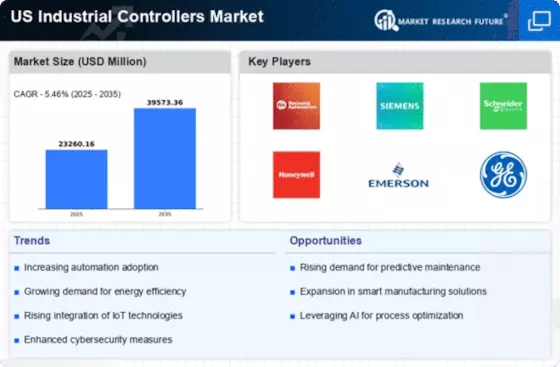Government Initiatives and Regulations
Government policies and regulations play a crucial role in shaping the US Industrial Controllers Market. Initiatives aimed at promoting advanced manufacturing technologies and enhancing industrial competitiveness are likely to bolster market growth. For instance, the US government has introduced various funding programs and incentives to encourage the adoption of smart manufacturing practices. These initiatives are designed to support industries in upgrading their control systems, thereby fostering innovation and efficiency. Furthermore, compliance with safety and environmental regulations necessitates the use of advanced industrial controllers, which are integral to maintaining operational standards. As a result, the regulatory landscape is expected to positively influence the demand for industrial controllers in the US.
Expansion of Smart Manufacturing Practices
The expansion of smart manufacturing practices is a key driver of growth in the US Industrial Controllers Market. As industries increasingly adopt the principles of Industry 4.0, the integration of smart technologies into manufacturing processes is becoming more prevalent. This shift involves the use of industrial controllers that can communicate with other devices and systems, facilitating data exchange and real-time decision-making. The market for smart manufacturing solutions is projected to grow significantly, with estimates suggesting a CAGR of over 10% in the coming years. This trend indicates a strong demand for advanced industrial controllers that can support the complexities of smart manufacturing environments. As a result, the US Industrial Controllers Market is poised for substantial growth as companies embrace these innovative practices.
Rising Demand for Automation in Manufacturing
The US Industrial Controllers Market is experiencing a notable surge in demand for automation across various manufacturing sectors. This trend is driven by the need for enhanced productivity, reduced operational costs, and improved quality control. According to recent data, the automation market in the US is projected to grow at a compound annual growth rate (CAGR) of approximately 9% over the next five years. As manufacturers increasingly adopt automated solutions, the demand for industrial controllers, which serve as the backbone of these systems, is expected to rise significantly. This shift towards automation not only streamlines processes but also allows for real-time monitoring and data collection, further driving the growth of the US Industrial Controllers Market.
Technological Advancements in Control Systems
Technological advancements are significantly impacting the US Industrial Controllers Market. Innovations in control systems, such as the development of more sophisticated programmable logic controllers (PLCs) and distributed control systems (DCS), are enhancing operational capabilities. These advancements enable manufacturers to implement more complex automation solutions, which can lead to increased efficiency and reduced downtime. The integration of advanced features, such as remote monitoring and diagnostics, is becoming increasingly common. As industries seek to leverage these technologies to optimize their operations, the demand for cutting-edge industrial controllers is likely to grow. This trend suggests a robust future for the US Industrial Controllers Market as companies invest in modernizing their control systems.
Growing Focus on Cybersecurity in Industrial Automation
As industrial automation systems become more interconnected, the focus on cybersecurity within the US Industrial Controllers Market is intensifying. The increasing incidence of cyber threats poses significant risks to manufacturing operations, prompting companies to prioritize the security of their control systems. This heightened awareness is driving the demand for industrial controllers that incorporate advanced cybersecurity features. Manufacturers are now seeking solutions that not only enhance operational efficiency but also safeguard against potential cyberattacks. The market for cybersecurity solutions in industrial automation is expected to expand, reflecting the critical need for secure industrial controllers. Consequently, this focus on cybersecurity is likely to shape the future landscape of the US Industrial Controllers Market.















